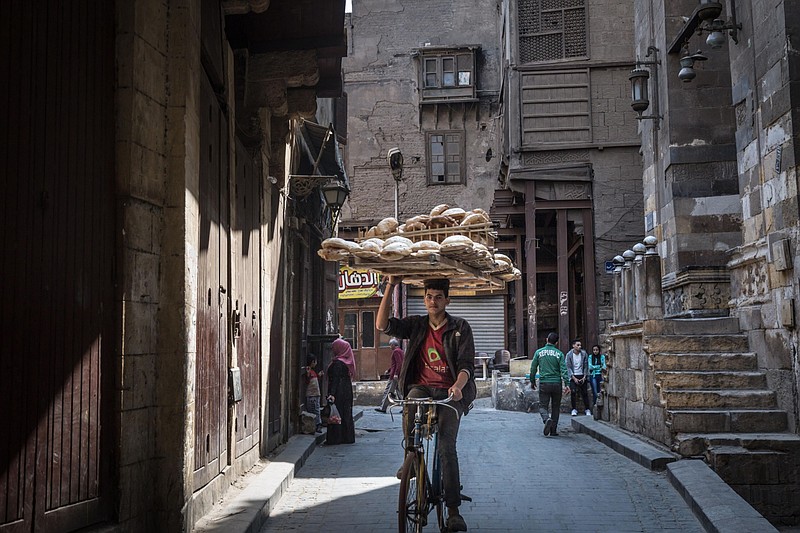What can the world's biggest buyer of wheat do when supplies from mainstay providers Russia and Ukraine are choked by war? For Egypt, it could mean pressing ahead on a delicate venture: raising the price of subsidized loaves for the first time in four decades.
Russia and Ukraine delivered 86% of Egypt's wheat imports in 2020, according to the United Nations, and the combination of combat, fast-moving sanctions announcements and surging freight and insurance costs is propelling the grain to its highest price in more than a decade. That carries extra resonance in this North African nation, where rising food costs contributed to the Arab Spring protests a decade ago.
Egypt already was struggling to maintain the subsidy used by about 70 million people in the face of a pandemic, and war could make things worse. Current wheat stocks are sufficient for at least four months, but shipments from much of the Black Sea region are stalled by the conflict, likely pushing prices even higher.
"We expect that the Russian-Ukrainian war will speed up the bread-price issue," Saied Abu Mohamed, a 45-year-old father of two, said while lining up for subsidized bread in Cairo's al-Khalifa neighborhood. "On many occasions, we hear officials insisting on reviewing bread prices. The opportunity has come to them on a golden plate."
The average price for imported wheat has risen to about $350 a ton, compared with $250 last year, supply minister Aly El-Moselhy said in a television interview last week. The budget for this fiscal year is based on $255, according to finance ministry documents.
The higher prices put pressure on the budget deficit. While lifting subsidies could put millions of Egyptians under increased economic strain, it would help shore up state finances.
The most-populous Arab nation allocated about $1.4 billion for wheat imports and another $1.1 billion to subsidize local production.
The government expects about 5 million tons from the local harvest, an increase from previous estimates of 4 million tons, and that should boost stocks enough to cover consumption until November, the minister said.
"I want to assure people that there's no need to worry," he said. "There's a political will and vision to maintain wheat reserves, and the government is availing the necessary funds for that."
Any conversation about removing bread subsidies was unheard of in the past, and the current government of Abdel-Fattah el-Sissi was the first to put the debate out in public. He's pushing for an expansive overhaul of the economy, tackling everything from infrastructure to how the subsidies are allocated.
The president last year called for raising prices of subsidized bread to ease the strain on government coffers. The government also could downsize the program so only the poorest people -- about 25 million -- qualify for subsidized bread, El-Moselhy said. Prices for them wouldn't change.
"If we don't study and analyze the situation to make sure the system benefits the most needy, then we will be in the wrong," he said.
Bread is so central to North African diets that Egyptians and Moroccans refer to it as "living." Leaders in the region have spent hundreds of billions of dollars making staples such as bread, cooking oil and sugar affordable. That was seen as a way for governments to gain legitimacy and pacify the population.
A subsidized flatbread loaf in Egypt sells for the equivalent of about 1 U.S. cent. The country allocates five loaves a day to people in the program and uses the public treasury to compensate bakers for their losses.
An attempt in the late 1970s by then-President Anwar Sadat to end subsidies on basic foodstuffs triggered riots that left more than 80 people dead, so the government since has resorted to workarounds such as shrinking the size of loaves.
"Egypt will walk a bit of a tight rope, as the government seeks to maintain its fiscal adjustment policies amid supply-chain challenges," the Eurasia Group said in a note this week. "Disruptions to or higher grain/import costs coupled with the incremental lifting of energy subsidies could be felt by the population at large."
The scope of Egypt's exposure to international markets was evident last week,when it drew just three offers in a closely watched tender and ultimately canceled it due to high prices. That followed another cancellation last month when the only offer was from France.
"Egypt is already suffering because of Russian aggression," ambassadors from the Group of Seven nations said in a joint statement Tuesday. "Wheat prices and foodstuff prices will rise across Egypt and across Africa."
North Africa gets about half its wheat from Russia and Ukraine -- which capitalize on lower production costs and rich, fertile soil -- and the conflict is forcing Egypt's neighbors to pivot.
Tunisia is looking to Uruguay, Bulgaria and Romania for alternative supplies, the agriculture ministry said in late February.
Morocco relies on the Black Sea region for about 25% of its soft imports, and it expects a few cargoes to arrive in coming days, said Abdelkader El-Alaoui, chairman of the Moroccan millers' group FNM.
The kingdom more than doubled wheat imports to 805,000 tons in January from a year earlier as parts of the country suffered from severe drought, data from the foreign trade regulator showed Wednesday.
"Only a fool relies on a single source, so we are turning to Argentina, France and Poland to make up for any problems affecting supplies from the Black Sea," El-Alaoui said.
-- Information for this article was contributed by Megan Durisin, Souhail Karam, Jihen Laghmari, Mirette Magdy and Michael Gunn of Bloomberg News.
egypt-bg

